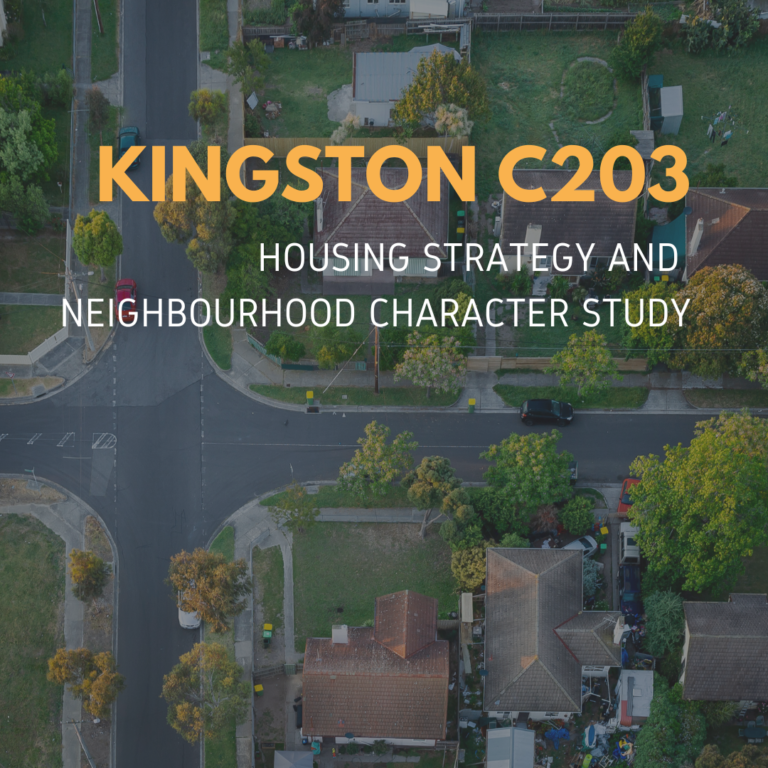The Amendment seeks to implement the Kingston Housing Strategy and Neighbourhood Character Study. It is the culmination of years of work by the Council, which started with the introduction of the reformed residential zones in July 2013. Appropriately, the final documents were influenced by the introduction of Planning Practice Notes 90 (Planning for Housing) and 91 (Using the Residential Zones) in December 2019. John was engaged by Council to provide expert evidence.
In John’s evidence, he broadly supported the Amendment although he recommended a redrafting and consolidation of the proposed policies and zone schedule. The Panel agreed with John’s findings, noting:
Mr Glossop, giving evidence on planning for Council, considered that the zone schedules should be used as the primary mechanism for guiding development, with the objectives within the schedules providing a key indicator for the character outcomes to be achieved. The Panel agrees.
Relevantly, the following finding will be relevant for other councils in the process of developing and implementing a housing strategy and neighbourhood character study:
The Panel notes overlaps between policy statements and schedule objectives. Together with a lack of consistency in the expression of the policy statements, the Panel considers that the proposed policy should be reviewed before the Amendment is approved. This review should transfer the specific policy statements into the objectives of the schedules so that future decision makers only need look in one place for precinct specific policy.
As with other similar amendments, a detailed assessment of housing supply and demand was critical in C203king. Both John and the Panel supported the forecasting which underpinned the Amendment, with the Panel finding:
The Panel considers that the demand and capacity forecasts provide sufficient evidence that there is potential capacity to meet any realistic assumptions about the likely level of future demand at least to 2038 and most likely to 2048. In drawing this conclusion, the Panel acknowledges the indicative nature of the forecasts the further they are into the future.
In emphasising the need for councils to treat housing studies as living documents, the Panel said:
Council and the community need to recognise that the current work will not be the last say on housing intensification in Kingston. The work will need to be reviewed in the future and in all likelihood that review will identify further areas for intensification, and potentially taller development in existing areas identified for intensification.
A feature of the Kingston Planning Scheme is the presence of an existing Design and Development Overlay (DDO1) that provides a 2-storey mandatory height limit along part of its foreshore.
Interestingly, the Panel recommended that land within DDO1 that was within the walkable catchment of activity centres be included in a General Residential Zone (which allows three storeys) rather than the Neighbourhood Residential Zone (which would match the two storey limitation). It said that:
The Panel does not believe DDO1 should be taken as a strategic driver of the housing strategy in Kingston without clear justification under current policy settings. This is not to say that coastal protection ought not occur, but it needs to occur in a strategic framework that balances character and housing growth. Because this strategic work did not reconsider DDO1 this balance has not been demonstrated for the areas covered by DDO1.
….
The wisdom of applying a two-storey height limit within the walkable catchments of train stations, some distance from the foreshore and in areas that are very similar to land on the other side of the tracks, should not simply be taken as a given in 2023. The ongoing merit of a two-storey height control in DDO1 is not apparent in these areas, but the strategic work simply accepted the limit as an existing constraint and did not review it from first principles. This is not what a combined approach to housing strategy and character is meant to do.
If you need assistance translating strategy into the Planning Scheme or require an expert witness for a planning scheme amendment or other strategic project, please contact us on 9329 2288 or email mail@glossopco.com.au.


